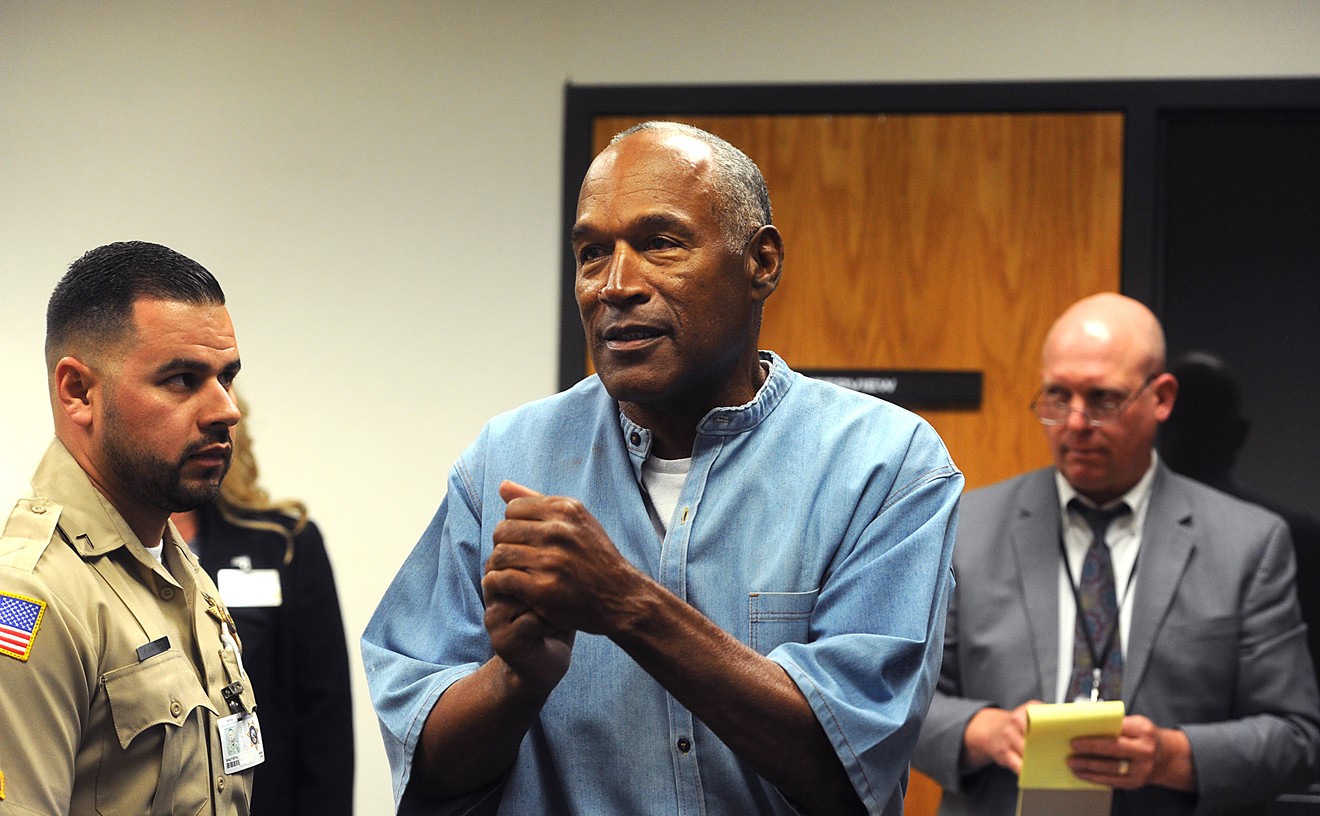Kaplan's taxpayer-subsidized acts of charity may not have been entirely altruistic. For the past several years, Kaplan, an attorney, has represented clients in Bolivia and has lobbied Bolivian officials in an effort to develop private business opportunities in that country. One of the enterprises Kaplan attempted to launch in Bolivia was a phone-sex service, according to his former chief of staff and business partner Matias Farias.
The Dade State Attorney's Office is investigating whether Kaplan used his elected office to curry favor with Bolivian authorities for personal gain. It has also begun questioning former members of the commissioner's staff regarding his Bolivian business dealings and the patients he has referred to Jackson Memorial Hospital.
Kaplan argues that his efforts to help Bolivian citizens have been entirely selfless and appropriate. "I've gotten to know a number of elected officials in Bolivia who regularly request humanitarian aid," he says, "and my understanding is that if we can arrange it, we should. There is nothing more special than being able to save a life."
For years Kaplan has treated Bolivia as if it were part of his commission district. In May 1994 he sponsored a resolution establishing Santa Cruz, Bolivia, as one of Dade County's nineteen sister cities. He is also honorary chairman of the Santa Cruz Sister City Committee, which acts as a liaison between Dade and Santa Cruz. According to Leo DiBenigno, coordinator for Dade's Sister Cities program, the Santa Cruz committee consists of exactly one person: Bruce Kaplan.
In his role as honorary chairman, Kaplan has traveled to Bolivia at taxpayer expense on at least four occasions. In 1994, at Kaplan's urging, the Sister Cities program contacted administrators at ten Dade County hospitals to encourage them to donate surplus medical equipment and supplies to officials in Santa Cruz, located some 300 miles southeast of La Paz, the capital. He also arranged to have several aging ambulances donated to Bolivia. In 1996 he sponsored a measure that would have sent 25 used police cars to the country as well, but he withdrew the request when his fellow commissioners objected.
By the fall of 1996, Kaplan's efforts to aid Bolivia drew him to Jackson Memorial Hospital. As chairman of the commission's Health and Public Safety Committee, which acts as the county's liaison to the hospital, Kaplan has had regular contact with Jackson's president Ira Clark. At least a half-dozen times in the past year, Kaplan or members of his staff have sent memos to Clark regarding possible patients from Bolivia.
This past January, for example, Kaplan wrote to Clark: "Please be advised that [name deleted], the Bolivian child suffering from leukemia, will no longer need to be admitted to Jackson Memorial Hospital. While we were doing the arrangements with your hospital, the National Children's Leukemia Foundation approved his treatment and the family decided to go with that institution. Since you had already approved the treatment for the above-mentioned child, I would appreciate it if you could extend that courtesy to another child suffering from similar conditions. Also, there is another case of a woman suffering from severe eye trauma that is in need of humanitarian assistance as well."
In another memo to Clark, Kaplan wrote that seven Bolivian officials would be traveling to Miami and wished to arrange for "comprehensive physical examinations" at Jackson during their visit. The memo went on to explain that "they have requested the appointments be scheduled for Friday, January 24, 1997, with follow-up visits for test results on Monday, January 27, 1997." Kaplan then listed the individuals' names and "the types of specialists they desire appointments with in addition to the comprehensive physical examinations." The specialists included cardiologists, gynecologists, and gastroenterologists. Kaplan noted that, unlike his previous requests, these would be paying customers.
Clark confirms that he has received more requests for patient care from Kaplan in the past year than from any other elected official, and that he does feel the need to respond promptly to Kaplan's inquiries. "I have to get along with the county commission," he says. "They own me. They own this hospital."
And Clark admits he may even have expressed frustration at Kaplan's intercessions. "I'm a fairly emotional guy," he concedes. "I've been irritated by Commissioner Kaplan's requests on many issues." But, he stresses, he has never felt threatened or intimidated by Kaplan into accepting a patient when it was not appropriate or when the patient did not meet the hospital's criteria for humanitarian cases.
The exact number of patients who have been treated at Kaplan's behest remains unclear, as does the cost to Dade taxpayers. In addition to the boy with leukemia and the girl with cancer, two other Kaplan patients were eventually referred to the University of Miami's Bascom Palmer Eye Institute, where Jackson officials were unable to track costs.
Many of Kaplan's humanitarian cases were referred to him by the wife of Bolivia's then-Pres. Gonzalo Sanchez de Lozada, whose term in office expired two months ago. Kaplan asserts there was no conflict in his doing favors for the first lady of Bolivia as a county commissioner while also conducting business in Bolivia as a private citizen. "There is no conflict," he insists. "I have never asked her about any business. We don't talk business, we talk about saving lives. You can't give everything a sinister spin."
Kaplan acknowledges that in the past he has attempted to establish assorted ventures in Bolivia, but so far he's been unable to "consummate business" there. He will not, however, describe the types of commerce in which he hoped to engage or say when he undertook his efforts.
In his role as an attorney, Kaplan says, he has "at times, represented clients in La Paz." Again, he will not identify those clients or say when he represented them, acknowledging only that there were "several."
Kaplan's 1995 financial disclosure forms list two major law clients: Mercury Air Group and Caribbean Telephone Company. (Mercury appears on Kaplan's 1996 disclosures as well; Caribbean Telephone does not.) Joseph Czyzyk, president of the Los Angeles-based Mercury Air Group, confirms that his firm does business in Bolivia, where it sells gasoline at the La Paz airport (as well as hundreds of other airports around the world). But Czyzyk is vague in explaining what services Kaplan has provided. "He has assisted us in numerous areas," he offers without further explanation.
The Caribbean Telephone Company, a corporation registered in the Cayman Islands, is owned by Broward resident Mark Bradbury. In a 1994 interview with the Miami Herald, Bradbury described his privately held company, which he founded in 1985, as a purveyor of long-distance telephone time throughout the Caribbean and Latin America. According to Bradbury, the company grosses $300 million annually and employs 470 employees in twelve countries.
Matias Farias, Kaplan's former chief of staff, says Bradbury's business also included phone sex. (Bradbury did not return phone calls seeking comment for this story.) Farias, a retired U.S. Air Force colonel, says that Kaplan and Bradbury approached him in late 1992 in hopes that he could introduce them to various Latin American government officials Farias had met while attached to the U.S. Southern Command in Panama.
According to a business agreement between Farias, Caribbean Telephone Company, and a company called the Manhattan Holding Corporation, a copy of which was obtained by New Times, the three would develop "audiotext information services throughout Latin America and the Caribbean." Says Farias flatly: "It was phone sex."
Farias claims he was to receive 2.5 percent of all revenue generated by any phone-sex lines he was able to establish. Kaplan is identified in the agreement twice: first as executive vice president of Caribbean Telephone Company and then as attorney of record for Manhattan Holding Corporation, a company registered in Panama. Farias says Kaplan had a similar arrangement in which he too would receive 2.5 percent of all revenue. (Kaplan would not respond to questions regarding the business agreement.)
Several months after Farias's agreement was signed, Kaplan was elected to the county commission and hired the ex-military man as his chief of staff.
According to Farias, the group successfully started a phone-sex operation in Panama toward the end of 1992. "In Panama we had twenty [phone lines]," he recalls. "We received phone calls from Europe, the Middle East, Southeast Asia, and the girls would answer them." That operation continued, he says, until several months ago.
Farias also recalls a trip he took with Kaplan to Bolivia not long after Kaplan was elected to the county commission. He claims he introduced Kaplan to a General Greminger (Farias does not recall the man's first name), who in turn introduced Kaplan and Farias to Bolivian government officials responsible for the country's telephone system. Although negotiations went on for months, in the end he and Kaplan were unable to finalize a phone-sex deal because they could not agree on what percentage of profits would go to Bolivia, Farias says.
Kaplan denies he was ever knowingly involved in the phone-sex business. "I have never been specifically retained to represent phone sex," he says carefully. "One of the areas of my practice is telecommunications, but in no contract that I've negotiated has a reference to phone sex ever been made."
Kaplan will not discuss his business relationship to Caribbean Telephone or Manhattan Holding, claiming that it is shielded by attorney-client privilege, but he does say that if they were involved in phone sex, he was "not aware" of it.
Because a politician doing business with Dade County firms inevitably leads to conflicts, Kaplan remarks, he has attempted to build a law practice in Latin America. After all, as a county commissioner he receives only $6000 per year in salary. "I have to make a living somewhere," he says.










